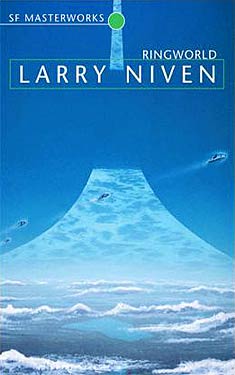Read 4/2013, reviewed 4/13/2013
4 stars
I had trouble starting this book. I had heard so many rave reviews of the book
dating back to friends from the 70’s. I
was a little afraid of the hardness of the science fiction. The fact that a sequel was called Ringworld
Engineers brought up my less than admirable feelings towards the engineering
students I rubbed elbows with at the University of Colorado (the Math
department and classes were located in the Engineering Center).
 The book started well with Louis Wu’s 200th
birthday, but stumbled for me with the introduction of the two main alien
characters, Nessus and Speaker-to-Animals.
My first impression was that they were too cartoonish. Again, it raised my distaste for alien
species based on earth creatures and their earthly characteristics (here, a
horse and a tiger, respectively). But by
the middle of the book, I was hooked. I
had made peace with my bias, and found the aliens to be the perfect such aliens
of this genre. They grew on me as their
personalities grew and fleshed out.
The book started well with Louis Wu’s 200th
birthday, but stumbled for me with the introduction of the two main alien
characters, Nessus and Speaker-to-Animals.
My first impression was that they were too cartoonish. Again, it raised my distaste for alien
species based on earth creatures and their earthly characteristics (here, a
horse and a tiger, respectively). But by
the middle of the book, I was hooked. I
had made peace with my bias, and found the aliens to be the perfect such aliens
of this genre. They grew on me as their
personalities grew and fleshed out.
I made peace, too, with my bias against engineering and hard
sci fi. The description of and journey
through Ringworld was amazing. It
reminded me at times of Neverwhere by Neil Gaiman and the animated film Howl’s Moving Castle
I liked Louis and Teela, as well as their relationship. At times, I was a bit put off by Teela’s
simplicity, raising my easily ruffled sensitivity towards portrayals of women
in science fiction. But I found myself
accepting her as being not a typical woman, because of her “gift” of luck. And I loved how she grew through the book.
I also enjoy the whole concept of engineering/interfering/experimenting
with life. It was done well here.
My biggest criticism was that flycycles seemed a bit to
amazing to be real. They flew hundreds
of thousands of miles with an undescribed energy source (unless I missed it
somewhere). They had tons of controls,
including the ability to make food. Given
the amount of my suspension of disbelief in their existence, it was then hard
to believe that they could crash.
When I was done with the book, I was glad I had read it, and
wished I had read it back in the 70s or 80s.
Although at the time, I don’t think I would have had as critical an
eye. 4 stars.
No comments:
Post a Comment